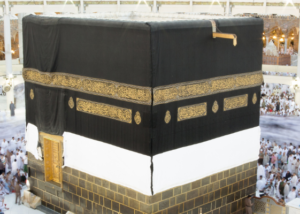Is the Hadith about specific reward for reciting Darood Sharif eighty times on Friday authentic?
Quran
Hadith
Islamic Text
It is difficult to trace this Hadith about reciting Darood Sharif 80 times on Friday back to well known original books of Hadith. One should refrain from narrating it until it is thoroughly referenced, and the authenticity is known.
This Hadith has been attributed to Imam Dar al-Qutni by Imam al-Iraqi:
من صلى علي في يوم الجمعة ثمانين مرة غفر الله له ذنوب ثمانين سنة قيل يا رسول الله كيف الصلاة عليك؟ قال تقول: اللهم صل على محمد عبدك ونبيك ورسولك النبي الأمي، وتعقد واحدة، وإن قلت اللهم صل على محمد وعلى آل محمد صلاة تكون لك رضاء ولحقه أداء وأعطه الوسيلة وابعثه المقام المحمود الذي وعدته واجزه عنا ما هو أهله واجزه أفضل ما جزيت نبيا عن أمته وصل عليه وعلى جميع إخوانه من النبيين والصالحين يا أرحم الراحمين. أخرجه الدارقطني من رواية ابن المسيب قال أظنه عن أبي هريرة وقال حديث غريب، وقال ابن النعمان حديث حسن. (المغني عن حمل الأسفار في الأسفار)
‘Whoever sends blessings upon me on the day of Jumu’ah eighty times, Allah (Glorified and Exalted is He) will forgive eighty years’ worth of his sins. It was said: O Messenger of Allah (Peace and Blessings be upon Him) how are blessings (to be bestowed) upon you? He (Peace and Blessings be upon him) said: ‘you say: O Allah send blessings upon Muhammad your slave, your Prophet, your Messenger the unlettered Prophet, then you count one. And you may say O Allah send blessings upon Muhammad and upon the family of Muhammad, a blessing you are pleased with, and is followed by fulfilment, and grant him the Waseelah, elevate him to the ‘praiseworthy rank’ that You promised him. Reward him on our behalf with the reward he deserves. Reward him with the best reward, you give to a Prophet from his nation. Send blessings upon him and upon all of his brothers from the Prophets and the righteous O Most Merciful of the Merciful.’ Narrated by al-Darqutni from the narration of Ibn al-Musayyib. He said: I think it is narrated by Abu Huraira, and he said the Hadith is Gharib. Ibn Al-Nu’man said it is a Hasan Hadith. (Imam al-Iraqi, Takhreej Ihya).
ورواه الدارقطني عن ابن المسيب قال: أظنه عن أبي هريرة بلفظ: “من صلى علي يوم الجمعة ثمانين مرة؛ غفر الله له ذنوب ثمانين سنة”، قيل: يا رسول الله، “كيف الصلاة عليك؟ ” قال: “تقول: اللهم صلِّ على محمد، عبدك ونبيك ورسولك، النبي الأمي، وتعقد مرة واحدة. “وهو حسن كما قاله العراقي. (كشف الخفاء ومزيل الإلباس)
(Imam) al-Darqutni narrated on the authority of Ibn al-Musayyib, who said I think it is from Abu Hurairah, with the wording: ‘Whoever sends blessings upon me on the day of Jumu’ah eighty times, Allah (Glorified and Exalted is He) will forgive eighty years’ worth of his sins. It was said: O Messenger of Allah (Peace and Blessings be upon Him) how are blessings (to be bestowed) upon you? He (Peace and Blessings be upon him) said: ‘you say: O Allah send blessings upon Muhammad your slave, your Prophet, your Messenger the unlettered Prophet, then you count one.’ It is Hasan as stated by al-’Iraqi. (Kashf al-Khafa, Imam al-Ajlooni).
Despite extensive research this Hadith could not be found in the books of Imam al-Darqutni. Until it is located in the cited work, we have to refrain from attributing it. Therefore, we should look for other sources.
أَنَا مُحَمَّدُ بْنُ عَلِيُّ بْنُ عُبَيْدِ اللَّهِ قَالَ أَنَا أَبُو مَنْصُورٍ قَالَ أَنَا أَبُو حَفْصٍ الْكَتَّانِيُّ قَالَ نا أَبُو بَكْرٍ مُحَمَّدُ بْنُ جَعْفَرِ الْمَطِيرِيُّ قَالَ نا وَهْبُ بْنُ داؤد قَالَ نا إِسْمَاعِيلُ بْنُ إِبْرَاهِيمَ قَالَ نا عَبْدُ الْعَزِيزِ بْنُ صُهَيْبٍ عَنْ أَنَسِ بْنِ مَالِكٍ عَنِ النَّبِيِّ صَلَّى اللَّهُ عَلَيْهِ وَسَلَّمَ أَنَّهُ قَالَ:” مَنْ صَلَّى علي يوم الجمعة مائتي غَفَرَ اللَّهُ لَهُ ذُنُوبَ ثَمَانِينَ عَامًا. فَقِيلَ لَهُ كَيْفَ الصَّلاةُ عليك قال: يقول اللهم صلي عَلَى مُحَمَّدٍ عَبْدِكَ وَنَبِيِّكَ وَرَسُولِكَ النَّبِيِّ الأُمِّيِّ وَيَعْقِدُ وَاحِدَةً”. قَالَ الْمُؤَلِّفُ: هَذَا حَدِيثٌ لا يَصِحُّ قَالَ أَبُو بَكْرٍ الْخَطِيبُ وَهْبُ بن داؤد لَيْسَ بِثِقَةٍ. (العلل المتناهية في الأحاديث الواهية)
It was narrated to us by Muhammad ibn ‘Ali ibn ‘Ubaidullah who said: it was narrated to us by Abu Mansur who said: it was narrated to us by Abu Hafs al-Kattani who said: it was narrated to us by Abu Bakr Muhammad ibn Ja’far al-Matiri who said: it was narrated to us by Wahb ibn Dawud who said: it was narrated to us by Isma’il ibn Ibrahim who said: It was narrated to us by ‘Abdul ‘Aziz ibn Sohaib on the authority of Anas ibn Malik, that the Messenger of Allah (Peace and Blessings be upon him) said: ‘Whoever sends blessings upon me on the day of Jumu’ah two hundred (times), Allah (Glorified and Exalted is He) will forgive eighty years’ worth of his sins. It was said to him (Peace and Blessings be upon Him), how are blessings (to be bestowed) upon you? He (Peace and Blessings be upon him) said: ‘One says: O Allah send blessings upon Muhammad your slave, your Prophet, your Messenger the unlettered Prophet, then you count one.’ The Author (Imam Ibn al-Jowzi) said: This Hadith is not sound. Abu Bakr al-Khatib said: Wahb ibn Dawud is not reliable. (al-Illal al-Mutanahiyah, Imam Ibn al-Jowzi).
Here Imam Ibn Jowzi narrated this Hadith (with slightly different wording) with his chain. So, we do have an established source for it. However, he himself clarified that it is not authentic. Students of Hadith recognise that narrations in books as late is this are highly unlikely to be authentic.
A different Hadith, with a similar meaning, has been narrated in a much earlier Hadith collection:
حَدَّثَنَا عُمَرُ، نا الْحُسَيْنُ بْنُ إِسْمَاعِيلَ الضَّبِّيُّ، وَأَحْمَدُ بْنُ عَبْدِ اللَّهِ بْنِ نَصْرِ بْنِ بُجَيْرٍ، قَالَا: نا سَعِيدُ بْنُ مُحَمَّدِ بْنِ ثَوَّابٍ، أنا عَوْنُ بْنُ عُمَارَةَ، أنا سَكَنٌ الْبُرْجُمِيُّ، عَنْ حَجَّاجِ بْنِ سِنَانٍ، عَنْ عَلِيِّ بْنِ زَيْدٍ، عَنْ سَعِيدِ بْنِ الْمُسَيِّبِ، أَظُنُّهُ عَنْ أَبِي هُرَيْرَةَ، قَالَ: قَالَ رَسُولُ اللَّهِ صَلَّى اللَّهُ عَلَيْهِ وَسَلَّمَ: «الصَّلَاةُ عَلَيَّ نُورٌ عَلَى الصِّرَاطِ فَمَنْ صَلَّى عَلَيَّ يَوْمَ الْجُمُعَةِ ثَمَانِينَ مَرَّةً غُفِرَتْ لَهُ ذُنُوبُ ثَمَانِينَ عَامًا». (الترغيب في فضائل الأعمال)
It was narrated to us by ‘Umar, who narrated to us from al-Hussain ibn Isma’il al-Dabbi, and Ahmad ibn ‘Abdullah ibn Nasr ibn Bujayr. They said: It was narrated to us from Sa’id ibn Muhammad ibn Thawaab, from ‘Awn ibn ‘Umaara, who said it was narrated to us from Sakan al-Burjumi on the authority of Hajjaj ibn Sinaan, (who narrated) from ‘Ali ibn Zayd, from Sa’id ibn al-Musayyib who may have narrated from Abi Hurairah (May Allah Most High be pleased with him) who said that the Messenger of Allah (Peace be upon him) said: ‘Sending blessings upon me is light on the Siraat. Whoever sends blessings upon me on the day of Jumu’ah, eighty times, will have eighty years (worth of) sins forgiven.’ (al-Targheeb fi Fadail al-Amaal, Imam Ibn Shaheen).
This is not one of the more famous Hadith collections. However, it does contain a complete chain. It has proven difficult to find classical scholars commenting on the authenticity of this particular chain. Therefore Tawaquf is best. Meaning one should refrain from forwarding this Hadith to others. Rather one should forward Hadith from more famous Hadith collections, with authenticated chains of narration.
It is necessary to be cautious with the words of the Holy Prophet (Peace and Blessings be upon him). Therefore, one should not forward a Hadith to others without it being confirmed as sufficiently authentic. At the same time, one should not reject a Hadith until it has been proven to be a fabrication or baseless. Rather one should hold back (Tawaquf). Unfortunately, too many Muslims are unaware of such guidance and either forward Hadith without checking or declare hadith to be baseless without citing the authority of a credible scholar of Hadith.
Therefore, we should adopt the position of Tawaquf with this Hadith, unless or until further proof is provided to confirm it is sufficiently authentic or baseless.
And Allah (Most High) Knows Best.
– Answered by Shaykh Noorud-deen Rashid (11.02.2022)
– Special thanks to Sidi Yusuf Asghar for assisting with Nusoos translation.
See also:
Are there specific virtues regarding the Day of Jumu’ah?
See also (video)






